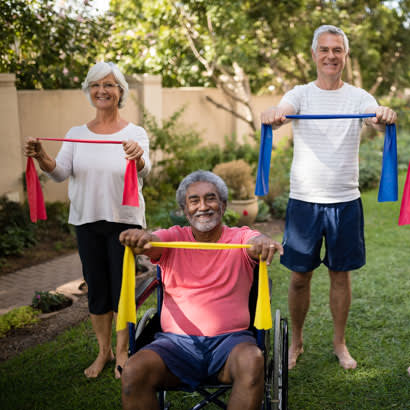
Park and recreation departments across the country are establishing inclusive recreation programs and participation opportunities to give all citizens — from toddlers to seniors — an equal opportunity to participate in local activities, classes and athletic events. Such programs are helping communities to foster cultures of social inclusion and acceptance, and are helping young people develop into confident, capable adults, no matter their learning or development challenges. If you are ready to incorporate such programming into your activities, it will be critical that you understand the fundamentals of a successful implementation.
What Is Therapeutic and Inclusion Recreation Programming?
As a foundation for your efforts, it’s important to understand the fundamentals of inclusion and therapeutic programming, as they pertain to local government parks and recreation.
Inclusion refers to community services that provide reasonable accommodations for citizens with disabilities to participate in recreation activities, use public facilities and enjoy community leisure activities. Reasonable accommodations may include the use of individualized techniques and resources to enhance program participation for those with special needs. To be successful, inclusion initiatives must incorporate internal training, disability awareness programs and facility accessibility modifications.
While inclusion services provide accommodations for disabled citizens to participate in existing programs, without fundamentally altering the program or activity, therapeutic recreation programs are separate, specially designed activities that aim to meet the physical, social, emotional and cognitive needs of their participants. Ideally, your community should balance both inclusion services with specialized therapeutic recreation programs to provide the most comprehensive community offering.
The Role of Your Park and Recreation Department
Therapeutic and inclusion services focus on abilities, rather than on disabilities, and enable individuals with physical, social or mental challenges to reach their fullest potential. In so doing, participants gain confidence, develop communication skills, experience moments of success, learn teamwork and make lasting friendships — all essential skills necessary for adolescent development.
As stewards of community activity participation and positive youth development, park and recreation leaders should advocate for the implementation of inclusion services and therapeutic programming in their community and for program promotion and citizen outreach and participation.
To achieve success, follow these best practices.
How to Implement a Successful Therapeutic and Inclusion Program in Your Community Programming:
- Communicate program benefits to all internal departments. By being part of a broader administration-wide conversation relative to inclusion services, your community will see higher adoption and more rapid success toward meeting the highest possible public accommodation standards.
- Staff an inclusive recreation coordinator. Depending on the size of your community and your park and rec department, you may need to hire a dedicated inclusion recreation coordinator or a certified therapeutic recreation specialist to facilitate programming accommodations and train instructors on safety protocols.
- Allow registrants to indicate if they will need reasonable accommodations. If parents or individuals who need accommodations do not see the opportunity to indicate that when they register, they may believe they will be unable to participate. If your department needs a certain amount of prior notice, note the differentiated deadline for individuals with special requests on the registration form.
- Create and implement the use of a voluntary inclusion questionnaire. For any individual who needs reasonable accommodations, provide a questionnaire that allows you to gather all the applicable information necessary for an activity to be safely and adequately adapted. Because questionnaire data may include protected health information, make sure all staff sign confidentiality agreements.
- Implement a leisure companion program. Consider a leisure companion program that pairs participants with disabilities with a trained volunteer companion, who provides additional support and helps facilitate the individual’s program participation. All companion volunteers should receive specialized training in both disability awareness and emergency medical assistance.
- Provide ongoing staff training. By hosting ongoing training on disability awareness, activity adaption, communications and accommodation procedures, you further reinforce the importance of inclusion and keep such critical topics as safety and confidentiality top-of-mind throughout the year.
- Ensure facility accessibility and universal design. Parks, gymnasiums, classrooms and other facilities used for recreation programs must meet accessibility standards required for parking lots, entrances, restrooms, activity areas and equipment. If you are unsure if your current facility meets the highest accessibility standards, partner with a local support organization to conduct an accessibility audit and work with you to make reasonable accommodations if necessary.
- Ensure affordability. Assess your current program’s financial structure and determine how you can enable participation by those for whom registration fees may be burdensome, especially given other possible health-related financial obligations.
- Promote program availability to your citizens. Advertise your program availability via all local marketing channels. Not only will citizens and parents of children with disabilities be pleased to learn about new program opportunities, it will reinforce your communitywide commitment to inclusion among all citizens.
By providing inclusive park and recreation activities, you will enable all generations of your citizens to come together to share in the same goal: being active and engaged in their home away from home.
Landon Schenck is General Manager for CivicRec

